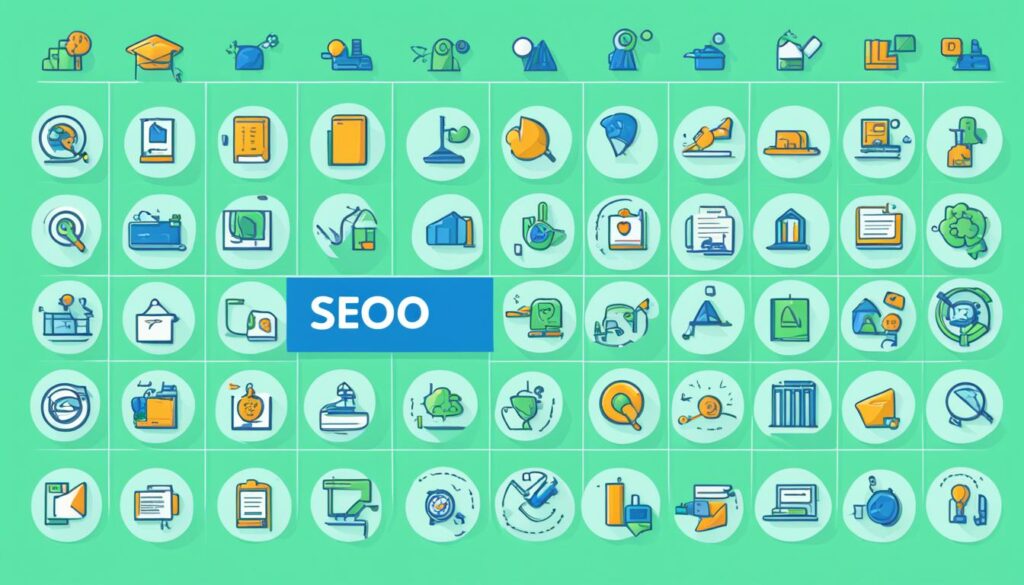Greetings, fellow marketers! In today's digital marketing landscape, understanding SEO is key to successfully promoting your brand online. However, navigating the world of search engine optimization can feel daunting, especially when faced with unfamiliar terminology. That's why I've compiled this comprehensive SEO glossary to equip you with the knowledge necessary to excel in the online arena.
Whether you're a seasoned marketer or just starting out, this glossary will demystify the language of SEO and empower you to make informed decisions that drive meaningful results. So, let's dive in and expand our digital marketing vocabulary together!

Key Takeaways:
- Enhance your digital marketing expertise with a comprehensive SEO glossary.
- Understanding SEO terminology is crucial for success in the online realm.
- Navigate the world of search engine optimization with confidence and make informed decisions.
- Expand your digital marketing vocabulary to effectively communicate and implement strategies.
- Uncover the language of SEO to thrive in the competitive online landscape.
SEO Basics
In this section, I will cover the fundamental concepts of SEO. Search Engine Optimization (SEO) is the practice of optimizing your website to increase its visibility and rank higher in search engine results pages (SERPs). By implementing effective SEO strategies, you can attract more organic traffic to your website and improve your online presence.
Understanding the basics of SEO is crucial for marketers looking to maximize their digital marketing efforts. Let's explore some key components of SEO:
1. Search Engine Optimization: What is it?
SEO refers to the process of optimizing your website to meet the requirements and guidelines set by search engines like Google, Bing, and Yahoo. The goal is to improve your website's ranking in SERPs, which in turn increases your visibility and drives organic traffic to your site.
2. Importance of SEO
SEO plays a pivotal role in digital marketing as it helps businesses connect with their target audience. By implementing SEO strategies, you can improve your website's visibility, increase organic traffic, and ultimately drive conversions and revenue.
3. Organic Traffic
Organic traffic refers to the visitors who arrive at your website through unpaid, natural search engine results. By optimizing your website for relevant keywords, you can attract more organic traffic and reach your target audience.
4. Keyword Research
Keywords are the foundation of SEO. Keyword research involves identifying the search terms and phrases that your target audience uses when looking for products or services related to your business. By incorporating these keywords strategically into your website's content, you can improve its visibility in search results.
5. On-Page Optimization
On-page optimization refers to the practices that you can implement on your website to improve its visibility and ranking. This includes optimizing meta tags, headings, URLs, and content to target specific keywords and provide a positive user experience.
6. Off-Page Optimization
Off-page optimization involves activities that take place outside your website, such as building high-quality backlinks, social media engagement, and influencer marketing. These strategies help establish your website's credibility and authority, improving its search engine rankings.
To create a successful SEO strategy, both on-page and off-page optimization techniques are essential.

| SEO Basics | Description |
|---|---|
| Search Engine Optimization | The practice of optimizing your website to increase its visibility and rank higher in search engine results. |
| Importance of SEO | Crucial for businesses to improve online visibility, drive organic traffic, and increase conversions. |
| Organic Traffic | Visitors that arrive at your website through unpaid, natural search engine results. |
| Keyword Research | The process of identifying relevant search terms and phrases to target in your website's content. |
| On-Page Optimization | Optimizing website elements such as meta tags, headings, URLs, and content to improve visibility and user experience. |
| Off-Page Optimization | Activities outside your website, such as building backlinks, social media engagement, and influencer marketing. |
On-Page SEO Techniques
When it comes to optimizing web pages, implementing effective on-page SEO techniques is essential. These techniques involve various factors, including meta tags, keyword density, internal linking, content optimization, and user experience. Let's explore each of these techniques in detail:
Meta Tags
Meta tags provide information to search engines about the content of a web page. They include the title tag, meta description, and meta keywords. Optimizing these tags with relevant keywords helps search engines understand the context and relevance of your web page.
Keyword Density
Keyword density refers to the percentage of times a target keyword appears in a piece of content compared to the total number of words. It is crucial to maintain a balance between using keywords naturally and avoiding keyword stuffing. Aim for a keyword density of around 1-3% for optimal results.
Internal Linking
Internal linking is the practice of linking to other pages within your website. It helps search engines navigate your site and understand the hierarchy and relationship between different pages. Well-structured internal linking also enhances user experience by providing easy navigation and relevant information.
Content Optimization
Content optimization involves creating valuable and relevant content that meets the needs of your target audience. This includes using target keywords strategically, organizing content with headers and subheadings, incorporating bullet points or numbered lists, and ensuring readability and coherence throughout the text.
User Experience
User experience plays a crucial role in on-page SEO. Search engines prioritize websites that provide a positive user experience. Factors such as page load speed, mobile responsiveness, intuitive navigation, and engaging visuals contribute to a seamless user experience, ultimately improving search engine rankings.
By implementing these on-page SEO techniques, you can optimize your web pages for better search engine visibility and user engagement, ultimately driving more organic traffic to your website.
Off-Page SEO Strategies
When it comes to improving your website's visibility and search engine rankings, off-page SEO strategies play a crucial role. These techniques focus on enhancing your online presence beyond the boundaries of your website. In this section, I will explore various off-page SEO strategies that can help you achieve your goals.
The Power of Backlinks
Building high-quality backlinks is an essential off-page SEO strategy. Backlinks serve as valuable endorsements from other websites, indicating to search engines that your content is trustworthy and relevant. By earning backlinks from authoritative sources, you can significantly boost your website's credibility and improve its search engine rankings.
Leveraging Social Media Platforms
Social media platforms have become powerful channels for promoting your website and building your online reputation. Engaging with your audience on platforms like Facebook, Twitter, and Instagram can help increase brand visibility, generate traffic, and attract potential customers. By incorporating social media into your off-page SEO strategy, you can enhance your online presence and reach a wider audience.
Managing Your Online Reputation
Your online reputation directly impacts your website's visibility and credibility. By maintaining a positive online reputation, you can attract more visitors and potential customers. Monitoring and responding to customer reviews, leveraging online review platforms, and actively managing your brand's image are crucial steps in building a strong online reputation that positively influences search engine rankings.
Utilizing Influencer Marketing
Influencer marketing involves collaborating with influential individuals in your industry to promote your products or services. Leveraging the reach and influence of these individuals can significantly boost your website's visibility and brand awareness. By tapping into their existing audience, you can drive more traffic to your site and attract potential customers who are already interested in your niche.
The Power of Guest Blogging
Guest blogging allows you to contribute valuable content to other websites in your industry. By sharing your expertise and knowledge, you can establish yourself as an authority in your field and attract a new audience. Additionally, guest blogging provides an opportunity to earn backlinks to your website, further enhancing your off-page SEO efforts.
By implementing these off-page SEO strategies, you can strengthen your website's visibility, improve search engine rankings, and drive targeted organic traffic. Remember, off-page SEO is a continuous process that requires consistent effort and strategic planning. Stay proactive and adapt your strategies as the digital landscape evolves.

Conclusion
In conclusion, this SEO glossary provides invaluable insights for marketers seeking to enhance their knowledge of SEO terms and concepts. By familiarizing themselves with these essential terms, marketers can navigate the complex landscape of digital marketing with confidence and implement effective strategies to succeed online.
Understanding the language of SEO is crucial for marketers looking to optimize their websites, increase organic traffic, and improve search engine rankings. With this glossary, marketers can stay up-to-date with the latest SEO trends and techniques, ensuring they have a competitive edge in the digital marketing landscape.
As the field of digital marketing continues to evolve, keeping pace with the ever-changing SEO landscape is essential. By mastering the terms and concepts discussed in this glossary, marketers can effectively communicate with SEO professionals, make informed decisions, and drive impactful results for their online presence.
In the dynamic world of digital marketing, having a solid understanding of SEO terms and strategies is a key differentiator for marketers. With this comprehensive glossary at their disposal, marketers can confidently navigate the complexities of SEO, unlock new opportunities, and position themselves for success in the online realm.
FAQ
What is SEO?
SEO stands for search engine optimization. It is the practice of optimizing a website to improve its visibility and rankings on search engine results pages (SERPs). SEO involves various techniques such as keyword research, on-page optimization, off-page optimization, and more.
Why is SEO important for marketers?
SEO is important for marketers because it helps increase organic traffic to their websites, improves online visibility, and boosts search engine rankings. By implementing effective SEO strategies, marketers can reach their target audience, generate leads, and increase conversions.
What is organic traffic?
Organic traffic refers to the visitors that come to your website through non-paid search engine results. It is generated when users click on your website's link in the search engine results pages (SERPs) while searching for relevant keywords or phrases.
What is keyword research?
Keyword research is the process of identifying and analyzing the keywords that users enter into search engines when looking for information, products, or services. It is an essential step in SEO and helps marketers understand what keywords to target and optimize their website's content.
What is on-page optimization?
On-page optimization refers to the optimization techniques applied directly on a webpage to improve its visibility and rankings on search engine results pages (SERPs). This includes optimizing meta tags, keyword density, internal linking, content, and user experience.
What are meta tags?
Meta tags are HTML tags that provide information about a webpage to search engines and website visitors. They include meta titles, meta descriptions, and meta keywords. Meta tags play a crucial role in on-page SEO as they help search engines understand the content and relevance of a webpage.
What is keyword density?
Keyword density refers to the percentage of times a keyword or phrase appears on a webpage compared to the total number of words on that page. It is an important on-page optimization factor, as it helps search engines determine the subject of a webpage and its relevance to a particular keyword or topic.
What is internal linking?
Internal linking is the practice of linking different pages or content within a website. It helps search engines understand the structure and hierarchy of a website, as well as improves user navigation. Internal linking is an important on-page SEO technique as it distributes link equity, improves crawlability, and enhances user experience.
What is content optimization?
Content optimization is the process of improving the quality, relevancy, and structure of the content on a website. It involves optimizing headlines, subheadings, body text, images, and other media elements to make them more appealing to both search engines and website visitors.
What is user experience?
User experience refers to the overall experience that users have when interacting with a website or digital product. In the context of SEO, user experience plays an important role in determining search engine rankings. A website that provides a positive user experience, such as fast loading times, easy navigation, and relevant content, is likely to rank higher on search engine results pages (SERPs).
What are off-page SEO strategies?
Off-page SEO strategies are techniques implemented outside of a website to improve its visibility and rankings on search engine results pages (SERPs). This includes building high-quality backlinks, leveraging social media platforms, managing online reputation, utilizing influencer marketing, and engaging in guest blogging.
What are backlinks?
Backlinks, also known as inbound links, are links from other websites pointing to your website. They are an important off-page SEO factor as they indicate to search engines that your website is trustworthy, authoritative, and relevant. Building high-quality backlinks can improve your website's visibility and search engine rankings.
How does social media impact SEO?
Social media does not have a direct impact on SEO rankings. However, an effective social media presence can indirectly improve your website's visibility and search engine rankings. By sharing your content on social media platforms, you increase the chances of attracting more visitors, generating backlinks, and enhancing brand awareness, which can ultimately improve your website's SEO performance.
Why is online reputation management important for SEO?
Online reputation management involves monitoring and influencing how your brand or website is perceived online. It is important for SEO because a positive online reputation can attract more visitors and potential customers, increase trust and credibility, and ultimately improve search engine rankings.
What is influencer marketing?
Influencer marketing is a strategy that involves collaborating with influential individuals or brands in your industry to promote your products or services. It is an effective off-page SEO strategy as it can help increase brand awareness, generate backlinks, and attract relevant traffic to your website.
What is guest blogging?
Guest blogging is the practice of writing and publishing content on someone else's blog or website. It is a popular off-page SEO strategy as it allows you to reach a wider audience, establish yourself as an industry expert, and acquire valuable backlinks to your website.











